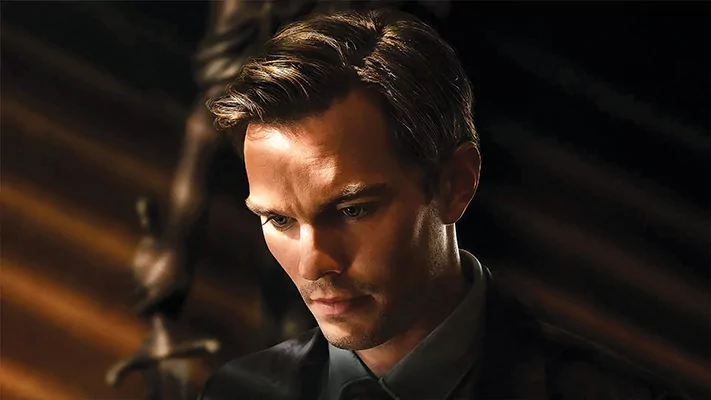No living American filmmaker can be plausibly said to have undergone such a profound artistic evolution as Clint Eastwood. From a greenhorn starring in Rawhide to an auteur of international standing in under a dozen years. Nor can any claim a comparable list of outright masterpieces: The Outlaw Josey Wales, Bronco Billy, Bird, the supreme achievements of Unforgiven, A Perfect World, and Mystic River. Few directors, ever, have elicited finer, subtler performances or more ably teased out the moral issues that reside within conventional genres.
Time is running short, though. Eastwood will turn 95 next May. So it should be a scandal that Warner Bros., his home studio of many decades, made his latest film, Juror #2, so scarce this autumn. The movie has barely been seen in American movie theaters. It rolled out on 31 screens in early November and appears to have been intended all along to end its life on the MAX streaming service, where it will be available starting on Dec. 20.
Juror #2 might seem to curry favor with film reviewers simply because of its novelty in the present dire cinematic moment. It is neither a comic book nor a musical about witches. But the film should be defended actively, not merely in comparison with other Hollywood junk. This is a movie as morally complex as Woody Allen’s Crimes and Misdemeanors but directed with the offhand confidence and competence of John Ford or Howard Hawks. Every performance is well judged, every plot development appropriately underscored, every grace note properly accented. It is, like its director, to be prized.

The film stars Nicholas Hoult as Justin Kemp, a features writer for a regional magazine in Georgia. With his profoundly pregnant wife, Allison (Zoey Deutch), Justin lives in a comfortable suburban home with a freshly painted and redecorated room for the coming baby in hues that would make Martha Stewart proud. Subtly and craftily, Eastwood introduces notes of danger. We see from a slip of mail that Justin has received a call for jury duty, and we hear from an ad on the car radio that it is election season. The prosecutor (Toni Collette) assigned to Justin’s case happens to be standing for district attorney. Any devotee of legal thrillers will know these are ominous signs, but there is pleasure to be had simply from watching Eastwood pull the strings with such ease and efficiency. His first film as a director was a thriller (Play Misty for Me); he knows just what to do and what to show.
The case on which Justin is selected to serve revolves around the violent end met by hard-partying Kendall Carter (Francesca Eastwood), whose brutally injured body was found in a creek beneath a bridge the morning after a rainstorm. The state asserts that her rage-possessed, good-for-nothing beau, James Michael Sythe (Gabriel Basso), killed Kendall in the aftermath of a barroom spat, but as Justin ponders the facts — the bar, the rainy night, that particular bridge over that particular creek — he calls to mind an incident he had long suppressed: a collision he had, that same night on that same road, with what he surmised was a deer. In the heat of the moment, the “Deer Xing” sign helped satiate his curiosity about what, or whom, he struck; he certainly saw no body. The prosecution claims that Kendall was beaten by James, but Justin fears he knows better: She was hit by a car, and it was likely his car. James is on trial, but Justin is in the dock.
Eastwood treats the trial rather perfunctorily: The filmmaker knows, and therefore we know, that James is innocent, and the testimony given against him is meant to ring glibly false — examples of the way witnesses at trial can speak with great confidence about that which they are merely guessing. How else to interpret the moment when a man takes the stand to say he saw James get out of his car on the night in question — when we already know that it was not James but Justin? True to a maker of Westerns, Eastwood has minimal faith in civic institutions.
This is a morality play destined to unfold not in open court but in the jury room. There, Justin faces a choice: As a juror, he can either lobby for James’s wrongful conviction but increase the odds that he himself is never targeted or he can argue for James’s rightful acquittal but increase the chances that he may one day face consequences. This is the sort of drama in which one can all too easily adopt the calculations of the protagonist. Should Justin act on the knowledge he alone has? Can he do so while preserving his own freedom? It’s a pickle.
For the rest of the jury, however, the trial is just an opportunity to socialize, climb atop a soapbox, and boss others around. The self-nominated foreperson is a stay-at-home mother named Denice (pert Leslie Bibb), whose evident pleasure in the process does not prevent her from quickly taking a poll of her colleagues and expressing relief at its near-unanimity: Nearly everyone is inclined to issue a guilty verdict. Initially, the only jurors who emerge as contrarians are (of course) Justin and a police officer-turned-florist named Harold (J.K. Simmons, agreeably gruff).
Strongly inclined to acquit the defendant, Justin at first makes common cause with Harold but changes course after Harold initiates his own rogue investigation, concludes Kendall died from a hit-and-run, and produces a list of cars that have had repairs made on them (including Justin’s). Cannily, Justin maneuvers to have Harold, but not himself, ejected from the jury.
Incrementally, other jurors are nudged toward reasonable doubt, including a long-haired stoner, a medical student, and the inevitable old bitty. Eastwood presents the deliberation process as one long slog among recalcitrant and opinionated triers of fact. Meanwhile, prosecutor Faith Killebrew (Collette), having been made aware of the now-dismissed Harold’s independent investigation, begins making some inquiries of her own. The narrative suggests two fast-moving trains hurtling toward each other but each unaware of the other’s existence: the first, Justin’s campaign to win James’s acquittal, and the second, Killebrew’s investigation to find out what really caused Kendall’s death — which will, if properly conducted, end on Justin’s doorstep.
CLICK HERE TO READ MORE FROM THE WASHINGTON EXAMINER
In a twist that ought not be spoiled, Justin reveals that, in the contest of attaining justice for the defendant and preserving his own hide, his own hide wins — a ruthlessly self-interested dimension to the character belied by Hoult’s placid, earnest exterior. He wants to save the accused, but he is unwilling to do so at his own expense. For much of the film, the libertarian-minded Eastwood seems inclined to endorse Justin’s perspective: Did not Dirty Harry himself traipse on laws with the aim of accomplishing the greater good?
For Justin, the “greater good” is being able to love and provide for his family, including the newborn daughter who arrives near the end of the picture. It’s a plausible philosophical argument, but the film’s finish upends much of what preceded it. In the final frames, Eastwood reveals the cosmic largeness of the law and the tininess of those, like Justin, arrogant enough to suppose they can manipulate it.
Peter Tonguette is a contributing writer to the Washington Examiner magazine.























